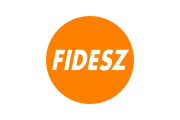Fides
Fides — Mađarski građanski savez Fidesz – Magyar Polgári Szövetség | |
|---|---|
 | |
| Predsednik | Viktor Orban |
| Potpredsednici |
|
| Šef poslaničke grupe | Mate Kočiš |
| Osnivači |
|
| Osnovana | 30. mart 1988. |
| Sedište | Budimpešta |
| Omladinski ogranak | Fidelitas |
| Ideologija | |
| Politička pozicija | desnica do krajnje desnice |
| Evropsko članstvo | Evropska narodna stranka (2004—2021) |
| Međunarodno članstvo |
|
| Grupa Evropskog parlamenta |
|
| Boje | narandžasta |
| Narodna skupština | 116 / 199
|
| Evropski parlament | 10 / 21
|
| Skupštine županija | 227 / 381
|
| Skupština grada Budimpešte | 10 / 33
|
| Zastava stranke | |
 | |
| Veb-sajt | |
| www | |
Fides — Mađarski građanski savez (mađ. Fidesz - Magyar Polgári Szövetség) je vladajuća politička stranka u Mađarskoj. Vodi je Viktor Orban.[1]
Osnovan je 1988. pod nazivom Savez mladih demokrata (mađ. Fiatal Demokraták Szövetsége) kao aktivistički pokret koji se suprotstavljao vladajućoj marksističko-lenjinističkoj vladi. Registrovan je kao politička stranka 1990. sa Orbanom na čelu. Ušao je u Narodnu skupštinu nakon parlamentarnih izbora 1990. Nakon izbora 1994. usvojio je liberalni konzervativizam što je dovelo do odlaska liberalnih članova i pridruživanja Savezu slobodnih demokrata. Zatim je nastojao da uspostavi vezu sa drugim konzervativnim strankama, a nakon izbora 1998. uspešno je formirao vladu desnog centra. Usvojio je nacionalizam početkom 2000-ih, ali je njegova popularnost blago opala zbog skandala sa korupcijom. Između 2002. i 2010. bila je u opoziciji, a 2006. je formirao koaliciju sa Demohrišćanskom narodnom strankom (KDNP).
Masovnim protestima 2006. vratila se Fidesu popularnost, što je dovelo do toga da je osvojio apsolutnu većinu na izborima 2010. Nakon povratka upravljanja Mađarskom, usvojio je nacionalno-konzervativnu politiku i pomerio se dalje udesno. Takođe je postao kritičniji prema Evropskoj uniji, što je dovelo do toga da je opisan kao evroskeptična stranka. Godine 2011. novi Ustav Mađarske je usvojen i 2012. je stupio na snagu. Zadržao je većinu mandata nakon izbora 2014, a nakon eskalacije migrantske krize, Fides je počeo da koristi desničarsko-populističku i antiimigrantsku retoriku. Od svog nastanka, politička pozicija Fidesa se drastično promenila, dok se danas smatra desničarskom ili krajnje desničarskom strankom.
Nakon parlamentarnih izbora 2022. ima većinu u Narodnoj skupštini sa 135 mandata. Od 2010. upravlja izborom predsednika Mađarske, a podržao je izbore svakog predsednika od 2000. godine i uživa većinu u svih 19 skupština županija, dok je u opoziciji u Skupštini grada Budimpešte. Fides je u početku bio član Liberalne internacionale do 2000. godine, nakon čega se pridružio Evropskoj narodnoj stranci. Ostao je njen član do 2021, a od tada radi sa grupom nezavisnih u Evropskom parlamentu.
Izborni rezultati
[uredi | uredi izvor]| Izborni rezultati | ||||||||
|---|---|---|---|---|---|---|---|---|
| Godina | Tip | Glasovi | % | Poslanici | Vlada | |||
| 1990. | 22 / 386
|
|||||||
| 1994. | 20 / 386
|
|||||||
| 1998. | 148 / 386
|
|||||||
| 2002. | 164 / 386
|
|||||||
| 2006. | 141 / 386
|
|||||||
| 2010. | 227 / 386
|
|||||||
| 2014. | 117 / 199
|
|||||||
| 2018. | 117 / 199
|
|||||||
| 2022. | 117 / 199
|
|||||||
Reference
[uredi | uredi izvor]- ^ Walker, Shaun (2018-04-06). „'You cannot negotiate with Orbán': hardline PM seeks fourth term”. The Guardian (na jeziku: engleski). ISSN 0261-3077. Pristupljeno 2023-04-18.
